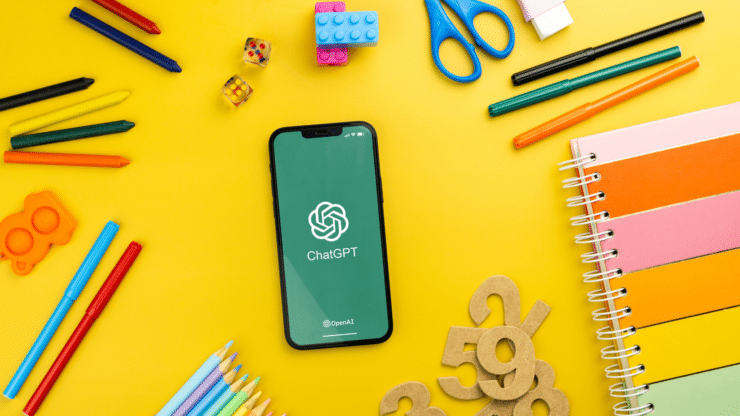Before I even knew ChatGPT existed, one of my favorite questions to ask my ESL students was, “If you had a robot that could do anything you wanted, what would the robot do?”
Nine times out of ten, my students would say, “Do my homework.” I would then typically ask them a follow-up question: “What would you do if you weren’t doing homework?” Their response? “Play.”
As a former Reggio Emilia teacher who is anti-homework and tests, I agree with them. They should be playing instead!
But now my ESL students’ dreams have come true. We now have ChatGPT and other, not-as-good-yet, chatbot tools like Bard and Bing completely changing how people write and communicate.
The news is going crazy with reports of schools all over the world scrambling to figure out what AI rules to implement with the sudden unleashing of this groundbreaking technology.
Some schools, including the largest school systems in the U.S., are choosing to attempt to ban AI entirely, while other educators are trying to figure out how to work with this new technology.
The thing that many of these news reports fail to mention is how the problems that traditional schools face, with the release of advanced AI, only highlights the fact that traditional schools are outdated and fail to provide an enriching and valuable learning environment for modern-day student.
ALSO: How You Can Apply the Reggio Emilia Philosophy at Home
Asking students to do homework assignments and take tests is like asking them to learn the proper way to hold a quill and dip it in ink without spilling everywhere. It’s just outdated busy work and a waste of their time. A child would get more educational value from doing project-based work based on their interests or playing.
All these traditional teachers and educators are up in arms about what to do, but they don’t address the root cause of the issue.

The problem is not that ChatGPT is a “calculator for words.” The problem is the way that most schools around the world operate is severely outdated and does not set up students to be independent, curious, empathetic, innovative, forward-thinking citizens of the world who value knowledge and respect nature and set life goals that will make them feel happy and fulfilled in life.
Instead, the traditional school model teaches students how to follow orders and memorize stuff well, with a good chunk of that stuff they have to memorize being completely useless to them in the real world.
As traditional educators run around in circles trying to stop technology from making their schools obsolete, there are already three well-known learning approaches that have been used for decades that cannot be negatively affected by technology.
Reggio Emilia, Waldorf Education, and Montessori are three of the most well-known play-based learning approaches that have very successful ways of teaching students in a way that is engaging and meaningful for them regardless of what technology is available.
These learning approaches rely on providing students with hands-on experiences, have limited to no technology in class, and are very adaptable since they focus on the individual interests and needs of each student.
These approaches also teach kids the core elements of a language arts class, which are how to read, write, think critically, and analyze literature and other written works in addition to many other important life skills in fun and engaging ways.
They not assign homework or ask students to take tests. Instead, Reggio Emilia, Waldorf Education, and Montessori teachers assess their students in a more natural way simply by observing them in school. Students also have projects that they work on instead of homework, based on their interests and skills.
ALSO: You Should Encourage Your Teen to Travel After High School
Instead of grades, teachers write an evaluation of their students which highlights their personalities, social skills, strengths, and anything they need more development on. Students, parents, and the student’s future teachers will be able to read this evaluation so they know how the student is doing in school and how to help them expand on their interests and improve on any skills they need more help with.
When it comes to teaching literacy, writing, literature, analysis, and creative thinking, Montessori, Waldorf, and Reggio have their own way of encouraging these skills in their students, but all three approach this in a way that is student-lead and focuses on the individual interests and needs of each student, rather than making them learn in a one-size-fits-all approach like in traditional schools.
Some traditional schools are already trying to apply play-based learning to their curriculum, but the change has been too slow and not enough schools have adapted these approaches. ChatGPT is forcing these schools to change faster whether they like it or not.
Banning AI in schools is not realistic and is not addressing the root of the problem. It will also cause more chaos since there isn’t an accurate way to tell if a student is using a chatbot to do their homework or not. Many students will end up being accused of using AI when they’re not, while others will get away with it.
Due to the restrictions students have when expressing their ideas in essays, many essays are written in a generic tone with the same cookie-cutter conclusions that make them sound like they were written by AI already. Plus, this notion that an essay about a work of literature is “right” or “wrong” means you’re begging a robot to write that essay instead of a human student.
Mainstream education should have been completely changed since at least the 1950s when the civil rights movement in the U.S. sparked the need for education reform. But instead, even though there have been changes to improve the education system since then, there hasn’t been enough change.
Many students continue to be taught in a way that makes them act and express themselves like robots while simultaneously being banned from using robots to complete their menial tasks for them.
Waldorf, Reggio, and Montessori were first developed in 1919, 1945, and 1907 respectively. The concept of allowing kids to think for themselves, learn at their own pace, ask questions about the world around them, and learn in an engaging and holistic way has existed for over 100 years!
There are many studies proving that play-based learning in early years education, student-led learning for older kids and teens, and project-based learning are more effective methods to teaching students that come with many benefits. These methods can be implemented right now in traditional schools.
As much as I prefer play-based education, I don’t think the answer is to make every single school in the world completely Reggio Emilia, Waldorf or Montessori. Different students, schools, cultures, and communities will have different needs, but educators can still adapt some of the learning approaches that have been successful in play-based schools for decades.
At the end of the day, schools need to be more adaptable and flexible to the diverse needs of each student if they want them to actually enjoy learning and benefit from going to school. The way that traditional schools are set up right now does not leave much room for flexibility or change and does not properly prepare students for the adult world.
A student who is in a learning environment where they get to decide what they learn and can choose what projects to work on based on their interests, and who is encouraged to share their opinions and find out answers themselves, is not going to ask a robot to write their poem for them. They will gladly write that poem themself.
But a student who is told what to think and do all day in a boring, soul-sucking environment full of endless tests and stacks of homework, is more likely to want to jump at the chance for a robot to do their schoolwork, so that they can have a moment of peace and freedom.









Add comment